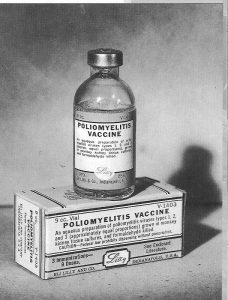 In Japan, a 7-month-old male baby exhibited a high temperature along with a perianal abscess (an accumulation of puss outside of the anus), fifteen days following his initial Oral Polio Vaccine. He abruptly developed aflaccid paralysis on day five of his stay in the hospital. His immune status showed no abnormalities at the time of admission.[1]
In Japan, a 7-month-old male baby exhibited a high temperature along with a perianal abscess (an accumulation of puss outside of the anus), fifteen days following his initial Oral Polio Vaccine. He abruptly developed aflaccid paralysis on day five of his stay in the hospital. His immune status showed no abnormalities at the time of admission.[1]
The flaccid paralysis improved on day ten, nevertheless, the child continued to experience paralysis of both lower limbs. On days forty two and forty five poliovirus was identified from the fecal material as being from the polio vaccine.
The child, now two, is unable to walk and has scoliosis.
Following a poliovirus infection, 98-99% of people don’t encounter signs or symptoms. Most commonly, they will experience a slight temperature, malaise, headache, a sore throat or intestinal problems.
Others have documented the potential risk of vaccine-associated paralytic poliomyelitis (VAPP) increased with tissue damage (i.e.intramuscular injection), within just one month of immunization with OPV.[2] In a different case report, Bosley and collegues reported an infant with VAPP who also had a perianal abscess.[3]
Asahina, et al. believe that the perianal abscess was an important factor in the development of VAPP and influenced how the disease manifested.
As demonstrated by the case report, adverse reactions to the Oral Polio Vaccine in healthy infants without any apparent immunodeficiencies can occur. Conversely, those with immune deficiencies, such as hypogammaglobulinemics, “…are 10,000 times more susceptible to vaccine-induced poliomyelitis than normal persons.”[4]
Sources:
1. Pediatr Int. 2010 Oct;52(5):838-41. Vaccine-associated paralytic poliomyelitis in a non-immunocompromised infant. Asahina N, Matsunami Y, Sueda K, Shiraishi H, Saitoh S. Department of Pediatrics, Hokkaido University Graduate School of Medicine, Kita-ku, Sapporo, Japan.
2. N. Engl. J. Med. 1995; 332: 500–6. Intramuscular injections within 30 days of immunization with oral poliovirus vaccine – a risk factor for vaccine associated paralytic poliomyelitis. Strebel PM, Ion-Nedelcu N, Baughman AL, Sutter RW, Cochi SL.
3. J. Infect. 2003; 47: 82–4. Provocation poliomyelitis: vaccine associated paralytic poliomyelitis related to a rectal abscess in an infant. Bosley AR, Speirs G, Markham NI.
4. J. Infect. 1973 Dec; 128 (6): 802-806. Poliomyelitis in Hypogammaglobulinemics. Wyatt, H.V.
